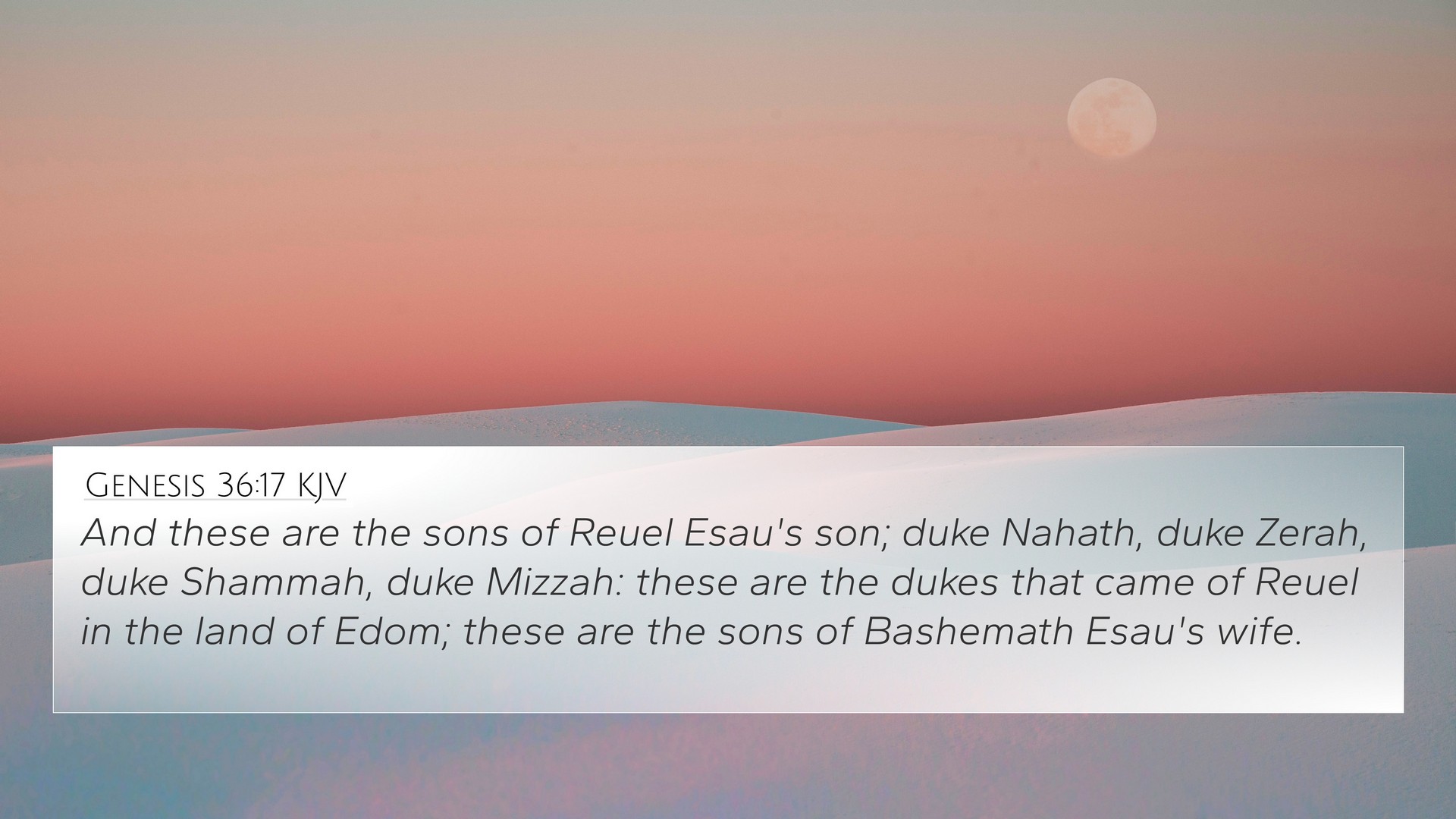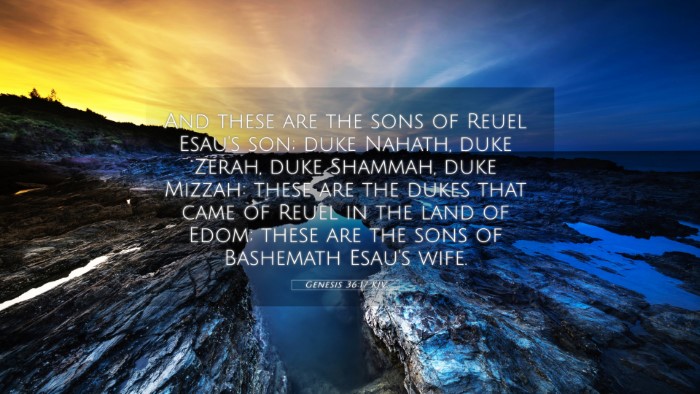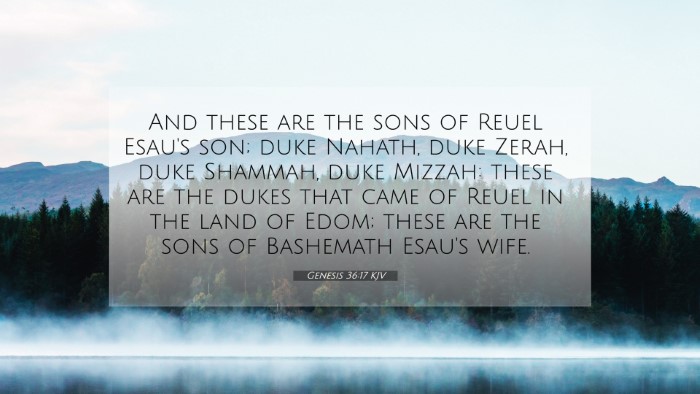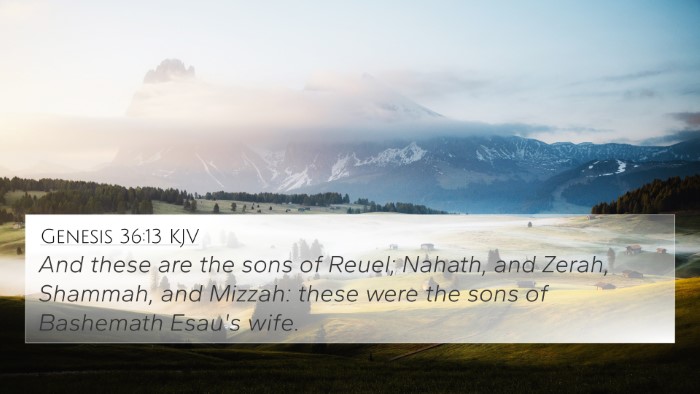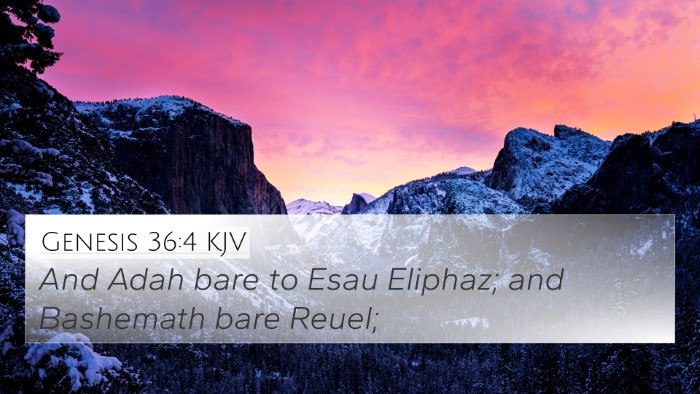Understanding Genesis 36:17
Genesis 36:17 provides a historical account concerning the descendants of Esau. This verse is situated within a genealogical context, chronicling the lineage and tribal affiliations emerging from Esau, who is notable in biblical history as the elder brother of Jacob. In understanding the meaning of this verse, we draw on insights from various public domain commentaries, including contributions from Matthew Henry, Albert Barnes, and Adam Clarke.
Verse Context
Genesis 36:17 states:
"And these are the sons of Reuel, Esau's son; Duke Nahath, Duke Zerah, Duke Shammah, Duke Mizzah: these are the dukes that came of Reuel in the land of Edom; these are the sons of Bashemath, Esau's wife."
Commentary Insights
- Matthew Henry's Commentary: Henry emphasizes the significance of genealogies in the biblical narrative, particularly in illustrating the fulfillment of God’s promises. He notes that the mention of Reuel's sons reflects God's continual plan of blessing through the descendants of Esau, often overlooked in favor of Jacob's lineage.
- Albert Barnes' Notes: Barnes comments on the importance of Edom in the biblical history, highlighting how the descendants of Esau formed distinct nations and tribes. He points out the titles 'Duke,' indicating leadership and the establishment of a structured society in Edom, reinforcing the notion of heritage and identity among Esau's descendants.
- Adam Clarke's Commentary: Clarke provides insights into the cultural significance of names mentioned in the verse, understanding that each duke corresponds to a particular tribe. He also points out that these personal names reveal the intimate connection between race and history, suggesting a divine ordination in their rise as nations.
Bible Verse Cross-References
Genesis 36:17 connects to various other scriptures that provide additional thematic insights and enhance our understanding of the text:
- Genesis 25:30: The story of Esau selling his birthright, setting the stage for the familial dynamics between him and Jacob.
- Genesis 36:1-2: Provides context about Esau's lineage and his establishment of the Edomite tribes.
- Exodus 15:15: Mentions the "Dukes of Edom," linking to the enduring legacy of Esau's descendants.
- 1 Chronicles 1:35-37: Offers a reiterated account of the descendants of Esau, providing consistency to the genealogical record.
- Obadiah 1:1: Addresses the fate of the Edomites, highlighting their historical significance in biblical narrative.
- Romans 9:13: Draws a stark contrast between Jacob and Esau, emphasizing God's sovereign choice, adding theological depth to their stories.
- Hebrews 12:16: References Esau's character and warns against unholy behavior, pointing to the moral lessons derived from his life.
Thematic Connections
Examining the intertextuality of Genesis 36:17 with other scriptural references, we can identify several themes:
- The Lineage of Nations: The emphasis on genealogies shows God's providential hand in the rise of nations, urging believers to understand their spiritual heritage.
- Covenant and Promises: Esau's descendants illustrate God’s plans extending beyond Israel, revealing a broader divine agenda.
- Identity and Leadership: The title 'Duke' signifies not only leadership within Edom but also reflects on the importance of identity and governance in biblical history.
Reflections on Cross-Referencing Biblical Texts
Engaging with Genesis 36:17 through cross-referencing significantly enriches our understanding of biblical narratives. Here are some tools and methods for effective Bible cross-referencing:
- Utilize a Bible concordance to identify related verses and themes.
- Employ a cross-reference Bible study guide to track connections across scripture.
- Familiarize yourself with cross-referencing Bible study methods to deepen your scriptural insights.
Conclusion
Genesis 36:17 serves not only as a genealogical note but as an essential part of the larger narrative surrounding God's dealings with humanity through the families of the patriarchs. By examining related scripture and employing cross-referencing techniques, deeper thematic connections are unveiled, offering profound reflections on God’s promises and His intricate plans for all nations. Understanding these connections aids in achieving a holistic view of biblical themes, enriching personal study and comprehension of God's Word.
